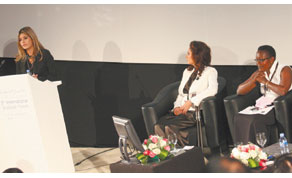 |
| A guest speaking on the second day of the conference at the Shafallah Centre |
Research into the difficulties facing people with disabilities is woefully lacking according to a visiting expert, who claimed that governments and organisations around the world need to do much more to provide data related to disabilities to enable comparisons and the establishment of best practices.
However, World Bank economist Aleksandra Prosarac said that while many improvements have to be made, global awareness and attitudes related to disability have greatly improved in recent years.
Prosarac was speaking at the Fifth International Shafallah Forum where she gave a presentation about the findings of the first “World Report on Disability,” conducted by the World Health Organisation and the World Bank.
Posarac was the executive editor on the report, which brought together research and data from more than 70 countries around the world to try and ascertain the best ways for governments to provide effective, affordable services for people with disabilities, and how best to implement the ‘Convention on the Rights of Persons with Disabilities’.
The report is split into nine chapters which address understanding disability, disability – a global picture, general healthcare, rehabilitation, assistance and support, enabling environments, education, work and employment and the way forward.
The main challenge in putting together the report, which took some five years to compile, was gathering enough viable statistical data and research to provide conclusive proof in almost every area of study.
Yet through looking at the social situations which people with disabilities face across the globe, and examining a number of countries which have introduced measures to provide better access to services, healthcare and jobs to a group of citizens which have traditionally been excluded and marginalised, the report makes a number of findings, as well as recommendations.
It concludes that there is evidence of widespread barriers to people with disabilities, and that there are certain inequalities regarding these people, such as the fact that more women and poor people have disabilities, and people with mental health disabilities are most likely to suffer from a lack of access to adequate healthcare, education and employment opportunities.
To help overcome these barriers, the report recommends first that nations must enable access to all mainstream systems, policies and services, something it suggests is of the utmost important in improving its standards.
They must also invest in specific programmes, adopt a national strategy, improved their human resource capacity, and involve people with disabilities in the entire decision making and implementation process.
They should provide adequate funding and improve the affordability of services, increase public awareness and understanding of disabilities, improve data collection and strengthen and support research into the situation facing people with disabilities today.
“There are not many examples of good practices and that was the biggest disappointment,” said Prosrarac, explaining that while countries such as Ecuador, Brazil and Argentina have made great strides, others have been less forward-thinking.
“But there are some good examples and we want countries to share their experiences to help decide what a particular country can do,” she added.

